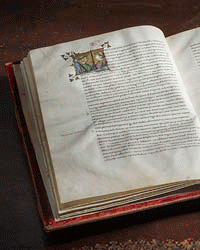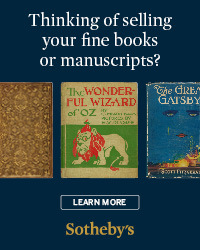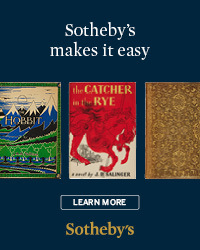Why do collectors collect, or more specifically, why do book collectors collect books? If you ask them, they will probably have an explanation such as a love of books, a life-long love of reading, a great interest in a subject or author. Perhaps there are physical aspects that motivate them, such as is the case with fine press books. And then there is the real reason. If Freud were here, he'd probably tell you it has something to do with your relationship with your mother, or perhaps poor toilet training. There are surface and deeper explanations, and Freud was very deep.
A specialist in this field is Professor Pieter ter Keurs. As Professor of Museums, Collections, and Society at the University of Leiden, he had the opportunity to study collections and collectors first-hand. He recently retired, and the University used the moment to post some of his comments on the subject. He explained, “For a long time, I didn’t see myself as a collector, but now I know that I like to surround myself with books on topics that fascinate me at that moment. I want to have everything about it immediately, turning my book collection into a sort of intellectual biography of my life.”
In an interview last year, prior to the publication of his book, Prof. ter Keurs explained, “The psychology of collecting. We all do it to some extent, but why? We know that there are economic aspects to collecting – people want to benefit financially – but it also has cultural aspects. You see it all around you. The desire to possess is human. With fanatical collectors there is often an underlying sense of lack or loss. That can be from the past: a bad relationship with your father, for example. You compensate for this lack by collecting objects.”
In the introduction to The Urge To Collect, which he co-edited with Holly O'Farrell, ter Keurs opines that the attraction between collectors and their collection is what Shopenhauer described as “an irrational force.” He continues, “Indeed, many collectors cannot verbalize why they collect, often very fanatically. People can't reason why they want certain objects...” Quoting German psychoanalyst Peter Subkowsi, he says, “There is always a mostly unconscious relationship between the concrete object and an individual's life history.”
French philosopher Jean Baudrillard explained it more bluntly, free of any sugar-coating. It is, he said, the “ultimate defence against the reality of the fear-inspiring passage of time, ending in one's inevitable death.” That should add a little more joy to the art of book collecting, something to think about each time you purchase another book.
Ter Keurs explains, “Collectors can use collecting as a means of compensating for a loss, trauma, or unconscious desire. There may also be a perverse desire. The examples of collectors with psychological problems are a fascinating read.” Collections can be a means of creating an ideal world out of chaos. He then reassures us by saying, “Not all collectors have a psychological problem. There are, of course, also a large number of collectors with stable, less eccentric personalities, but even among those collectors the urge to own objects, to surround themselves with them and to create a pleasant, confidential world is strong and often uncontrollable.”
Ter Kraus describes Sir Thomas Phillipps, one of the greatest book collectors ever. When he moved in 1863, it took nine months, requiring 103 wagon loads, 230 horses, and 160 men to move it all. Phillipps was, according to psychoanalyst Werner Munsterberger, a “disagreeable, socially maladjusted mentally ill man.” He attributed it to a difficult upbringing by his father, and that despite acquiring wealth, he was still outside the bounds of the nobility and therefore not socially accepted at the highest level. He compensated by collecting books.
Munsterberger was fascinated by the phenomenon of collecting, and was a collector himself. He studied the passion, and those for whom collecting transcended everything else, work, family, responsibilities. Munsterberger's main explanation for collecting, ter Kraus tells us, is “collectors often want to shield and compensate for major doubts and uncertainties. A difficult relationship with the past plays an important role in this.”
There you have it. Thank you, Freud, for opening up this can of worms. You may think you collect because you enjoy it, but the psychological reasons run much deeper and darker. You may not understand this but your spouse does, though being kind enough not to mention it. Collecting baseball cards, dolls, and books may have just been fun when you were young, but you're an adult now. Nothing is just fun anymore.


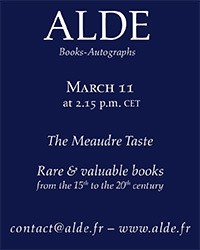
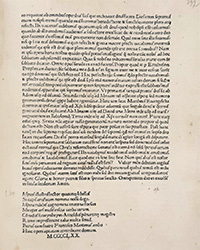
![<b>ALDE, Mar. 11:</b> [REGNART (LE LIVRE DE)]. <i>[Le] Docteur en malice, maistre Regnard, demonstrant les ruzes et cautelles qu'il use envers les personnes…</i> Rouen, 1550. €20,000 - €30,000. <b>ALDE, Mar. 11:</b> [REGNART (LE LIVRE DE)]. <i>[Le] Docteur en malice, maistre Regnard, demonstrant les ruzes et cautelles qu'il use envers les personnes…</i> Rouen, 1550. €20,000 - €30,000.](https://ae-files.s3.amazonaws.com/AdvertisementPhotos/ddd3b34c-8abc-4eae-8474-6ea05406ccd0.jpg)
![<b>ALDE, Mar. 11:</b> TRITHÈME (JEAN). <i>Polygraphie et universelle escriture cabalistique.</i> Paris, [Benoît Prévost pour] Jacques Kerver, 1561. €8,000 - €10,000. <b>ALDE, Mar. 11:</b> TRITHÈME (JEAN). <i>Polygraphie et universelle escriture cabalistique.</i> Paris, [Benoît Prévost pour] Jacques Kerver, 1561. €8,000 - €10,000.](https://ae-files.s3.amazonaws.com/AdvertisementPhotos/cbc8d1a4-d991-48c7-b788-7554a6774b0e.jpg)
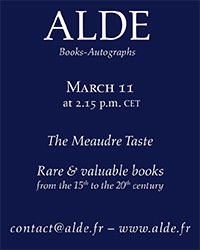
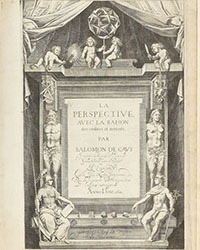
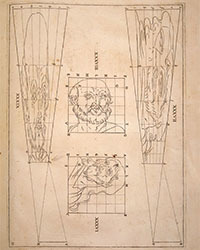
![<b>ALDE, Mar. 11:</b> VONTET (JACQUES). <i>L’Art de trancher la viande et toute sorte de fruits…</i> S.l.n.d. [probablement Lyon, vers 1647]. €20,000 - €30,000. <b>ALDE, Mar. 11:</b> VONTET (JACQUES). <i>L’Art de trancher la viande et toute sorte de fruits…</i> S.l.n.d. [probablement Lyon, vers 1647]. €20,000 - €30,000.](https://ae-files.s3.amazonaws.com/AdvertisementPhotos/21ad2e05-5544-44aa-887d-76df423e17af.jpg)
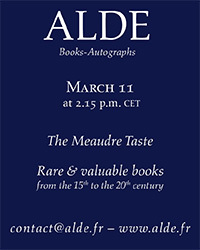
![<b>ALDE, Mar. 11:</b> HUGO (VICTOR). [Paysage spectral avec une église], [vers 1837]. €20,000 - €30,000. <b>ALDE, Mar. 11:</b> HUGO (VICTOR). [Paysage spectral avec une église], [vers 1837]. €20,000 - €30,000.](https://ae-files.s3.amazonaws.com/AdvertisementPhotos/dc734df9-0811-477f-919a-2563b8452855.jpg)
![<b>ALDE, Mar. 11:</b> [HERVEY DE SAINT-DENYS (LÉON D')]. <i>Les Rêves et les Moyens de les diriger. Observations pratiques.</i> Paris, Amyot, 1867. €3,000 - €4,000. <b>ALDE, Mar. 11:</b> [HERVEY DE SAINT-DENYS (LÉON D')]. <i>Les Rêves et les Moyens de les diriger. Observations pratiques.</i> Paris, Amyot, 1867. €3,000 - €4,000.](https://ae-files.s3.amazonaws.com/AdvertisementPhotos/7e769889-43a5-495e-a931-c511da576c2b.jpg)
![<b>ALDE, Mar. 11:</b> GACHET (PAUL-FERDINAND). <i>Les Chats de Gachet</i> (Manuscrit). S.d. [avant mai 1873]. €6,000 - €8,000. <b>ALDE, Mar. 11:</b> GACHET (PAUL-FERDINAND). <i>Les Chats de Gachet</i> (Manuscrit). S.d. [avant mai 1873]. €6,000 - €8,000.](https://ae-files.s3.amazonaws.com/AdvertisementPhotos/855dc2c0-17e3-4562-a1cc-2e7265c3769c.jpg)
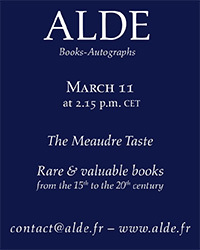
![<b>ALDE, Mar. 11:</b> [REDON (ODILON)]. PICARD (EDMOND). <i>Le Juré. Monodrame en cinq actes…</i> Bruxelles, Mme veuve Monnom, 1887. €7,000 - €9,000. <b>ALDE, Mar. 11:</b> [REDON (ODILON)]. PICARD (EDMOND). <i>Le Juré. Monodrame en cinq actes…</i> Bruxelles, Mme veuve Monnom, 1887. €7,000 - €9,000.](https://ae-files.s3.amazonaws.com/AdvertisementPhotos/b325eb41-450b-4bd6-851c-4125e04dfbe7.jpg)
![<b>ALDE, Mar. 11:</b> [TOULOUSE-LAUTREC (HENRI DE) ET HENRI-GABRIEL IBELS]. MONTORGUEIL (GEORGES). <i>Le Café-concert.</i> Paris, [1893]. €4,000 - €5,000. <b>ALDE, Mar. 11:</b> [TOULOUSE-LAUTREC (HENRI DE) ET HENRI-GABRIEL IBELS]. MONTORGUEIL (GEORGES). <i>Le Café-concert.</i> Paris, [1893]. €4,000 - €5,000.](https://ae-files.s3.amazonaws.com/AdvertisementPhotos/6588f3a0-90f2-464c-8125-a76866eabe85.jpg)
![<b>ALDE, Mar. 11:</b> [TERRY (EMILIO)]. <i>Projet de fontaine.</i> Dessin original au stylo et à l'encre noire. 1938. €2,000 - €3,000. <b>ALDE, Mar. 11:</b> [TERRY (EMILIO)]. <i>Projet de fontaine.</i> Dessin original au stylo et à l'encre noire. 1938. €2,000 - €3,000.](https://ae-files.s3.amazonaws.com/AdvertisementPhotos/0840c8e4-4f35-4c95-b2d3-3d5addd6fd51.jpg)
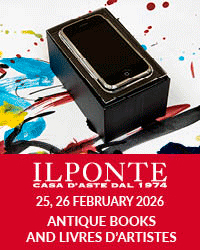
![Il Ponte, Feb. 25-26:
HAMILTON, Sir William (1730-1803) - Campi Phlegraei. Napoli: [Pietro Fabris], 1776, 1779. € 30.000 - 50.000 Il Ponte, Feb. 25-26:
HAMILTON, Sir William (1730-1803) - Campi Phlegraei. Napoli: [Pietro Fabris], 1776, 1779. € 30.000 - 50.000](https://ae-files.s3.amazonaws.com/AdvertisementPhotos/0372eeb9-97e1-47b2-baca-b3287d4704ee.jpg)
![<b>Il Ponte, Feb. 25-26:</b> [MORTIER] - BLAEU, Joannes (1596-1673) - Het Nieuw Stede Boek van Italie. Amsterdam: Pieter Mortier, 1704-1705. € 15.000 - 25.000 <b>Il Ponte, Feb. 25-26:</b> [MORTIER] - BLAEU, Joannes (1596-1673) - Het Nieuw Stede Boek van Italie. Amsterdam: Pieter Mortier, 1704-1705. € 15.000 - 25.000](https://ae-files.s3.amazonaws.com/AdvertisementPhotos/8f9ce440-b420-4407-8293-eb8e1b38ca19.jpg)
![<b>Il Ponte, Feb. 25-26:</b> TULLIO D'ALBISOLA (1899-1971) - Bruno MUNARI (1907-1998) - L'Anguria lirica (lungo poema passionale). Roma e Savona: Edizioni Futuriste di Poesia, senza data [ma 1933?]. € 20.000 - 30.000 <b>Il Ponte, Feb. 25-26:</b> TULLIO D'ALBISOLA (1899-1971) - Bruno MUNARI (1907-1998) - L'Anguria lirica (lungo poema passionale). Roma e Savona: Edizioni Futuriste di Poesia, senza data [ma 1933?]. € 20.000 - 30.000](https://ae-files.s3.amazonaws.com/AdvertisementPhotos/71bb9667-5d66-4aa8-96a2-9880c74a7a26.jpg)
